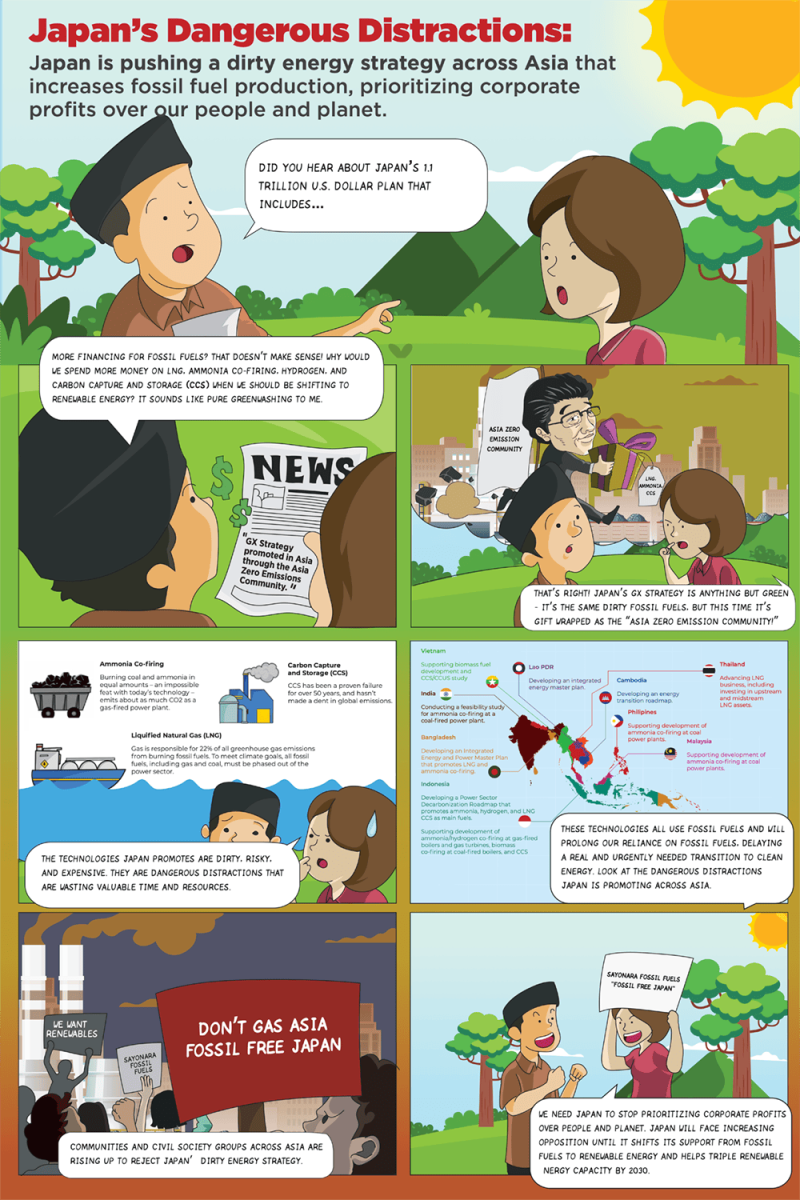
Leaflet Series: Japan’s Dangerous Distractions
Japan is promoting a dirty energy strategy across Asia that prioritizes fossil fuel production, putting corporate profits ahead of the people and the planet. This series of leaflets provides a wider audience with easy-to-understand information about Japan and its dangerous distractions.
Published by Oil Change International, May/June 2024
Carbon Capture and Storage (CCS) Japan’s Dirty Strategy Comic
Ammonia and Hydrogen Co-Firing Gas & LNG Leaflet
Japan is promoting a dirty energy strategy across Asia that prioritizes fossil fuel production, putting corporate profits ahead of the people and the planet.
Marketed under the guise of the “Asia Zero Emission Community,” this initiative claims to help Asian countries achieve their climate goals. However, the reality is that these technologies will extend our dependence on fossil fuels, hindering the critical and urgent transition to renewable energy.
OCI created these leaflets to provide a wider audience with easy-to-understand information about Japan and its dangerous distractions.
Four topics are covered in this series: Japan’s dirty energy strategy, LNG, CCS/CCUS, and ammonia-hydrogen co-firing. In addition to English, this series will be available in Bahasa Indonesia, Bengali, and Japanese.
Japan is pushing a dirty energy strategy across Asia that increases fossil fuel production, prioritizing corporate profits over people and the planet. Japan’s GX strategy is anything but green; it’s the same dirty fossil fuels, but now they are gift-wrapped as the “Asia Zero Emission Community!”
The technologies Japan promotes are dirty, risky, and expensive. They are dangerous distractions wasting valuable time and resources. These technologies will prolong our reliance on fossil fuels, delaying the real and urgently needed transition to renewable energy.
Ammonia and Hydrogen Co-Firing Leaflet
Ammonia and hydrogen co-firing are dangerous distractions that are wasting valuable time and resources in mitigating the climate crisis, yet the Japanese government is aggressively pushing countries across Asia to adopt these methods.
Co-firing involves replacing some of the coal used for combustion with ammonia, or hydrogen in the case of gas plants. By retrofitting power plants to burn ammonia, the fuel can be combusted alongside coal to generate power. This technology is ineffective, failing to cut greenhouse gas emissions enough to meet climate goals. This technology only prolongs coal and gas plant operations, harming health and the environment. It’s costly, economically unsound, and relies on unproven technology, delaying the shift to sustainable energy.
Carbon Capture and Storage (CCS) Leaflet
Carbon Capture and Storage (CCS) is a dangerous distraction promoted by fossil fuel companies and their government enablers to extend the use of dirty fossil fuels. CCS benefits the fossil fuel industry, not people or the planet.
CCS is a technology proposed to capture carbon dioxide (CO2) emissions produced by various industrial processes, particularly those related to fossil fuels and heavy industries. Once captured, the CO2 is transported and attempts are made to utilize or store it, mainly underground.
The Japanese government is promoting CCS as a climate solution. However, CCS has been a proven failure for over 50 years and hasn’t made a significant impact on global emissions. Investing in CCS only delays our transition to renewable energy.
Japan is pushing governments in Asia to build new fossil gas projects under the guise of development and transition to clean energy. Japan is the world’s largest provider of public finance for gas projects and liquified gas (LNG) import and export terminals. Fossil gas worsens the climate crisis, harms communities and ecosystems, and wastes precious time and resources. Gas is dirty, risky, and expensive.
Japan is driving fossil gas expansion to benefit Japanese corporate interests over the health and safety of our communities and our planet. New gas and LNG developments threaten to lock Asia into expensive and polluting energy systems and worsen debt burdens at a time when renewable energy is cheaper and available.
